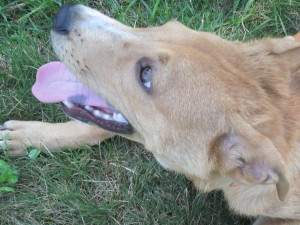My dad was double jointed. He could lay his palm flat on the kitchen table and fold his hand until the back of it touched the backs of his fingers. He didn’t realize he could do it until one day when he was leaning with his hand on a wall. Someone saw how his hand was folded, and said he should be in the circus.
The tips of the middle and ring fingers of my father’s right hand were missing. A month short of his twentieth birthday, he’d gotten shot during the Battle of Arnhem*, in Holland. He was crossing a field to deliver the message that his infantry unit needed more ammunition. I don’t know why it was his job to deliver the message. Maybe his commanding officer thought he was the one most likely to find his way to where he needed to go. He was his unit’s map reader.
I remember him reading the Times from cover to cover, and mysteries on the beach, and phone books in your hotel rooms (“lots of Polish names in Columbus,” he might say). But I don’t particularly remember him reading maps.
On car trips, he drove while my mother navigated. When they wanted calculate their progress, she would read off the mileage between the towns along the route, and he would respond with the running subtotal. From the backseat, it sounded like this:
M: 10 and 14.
D: 24.
M: 37.
D: 61.
M: 12.
D. 73.
…and so on, call-and-response, neither one missing a beat, until they had added up how much more road lay ahead. Hearing him add all those numbers in his head, I was dazzled.
He could read a map and he could fold back his fingers, but he couldn’t fold a map to save his life. That was also my mother’s job –smoothing the wrinkles, figuring out which way the pleats went, and closing it into a tidy accordion with the pretty tourist picture on the front, like the cover of a book.
In the book I’ve been writing and sending around and rewriting and sending around again and rewriting again since the beginning of this century, a ghost becomes displaced in time and ends up eavesdropping on events that took place before she was born. At one point, a woman’s perfume stirs memories from times that are in the ghost’s past, but years to come for the people she’s watching, so she’s simultaneously remembering and predicting the jasmine of her mother’s perfume, the woods outside her cabin at camp, the smell of steam rising from a particular pavement in the rain, the skunky must of her husband’s skin.
“Odor by odor, [her] memories unfolded. Fold by fold, they told the forgotten flipsides of stories she’d thought she remembered.”
The flipside of my father’s injury was that it took him out of combat. My mother used to say it may well have saved his life. Another way of putting it is that those two fingertips was the price he paid so that my siblings and I might be born.
It boggles the brain. As another character in my book puts it, “The gears that grind God’s universe are beyond my understanding.”
Tuesday is the anniversary of my father’s death. On the secular calendar, the date was August 20, 1994. That’s the date I remember each year as I try to grab one more beach day before summer winds down. On the Jewish calendar, the date was 14 Elul, 5754. That’s the date I remember each year when I stand up to say Kaddish for him for in synagogue.
Sometimes 14 Elul falls closer to the end of August, sometimes it comes in early September, and sometimes it comes within a day or two of August 20. As a Jew, I’m used to tracking time on two not-quite-aligned systems. The surprise is that this year, for the first time since my father died, the calendars converge. It will happen again in 2032.
I’ll be 75—older than either of my parents lived to be. I have no road map to predict what will unfold between now and then—just two syncopated calendars to help me count how far I’m come, and enough memories to keep me writing.
*Also known as Operation Market Garden, and dramatized in the film “A Bridge to Far.” Thanks to my brother Ben for clarifying this detail.




